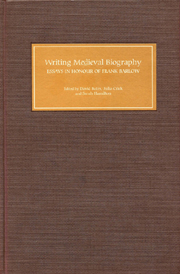Book contents
- Frontmatter
- Contents
- Preface
- List of Abbreviations
- Introduction
- 1 Did Charlemagne have a Private Life?
- 2 Bones for Historians: Putting the Body back into Biography
- 3 ‘Carriers of the Truth’: Writing the Biographies of Anglo-Saxon Female Saints
- 4 Alfred and his Biographers: Images and Imagination
- 5 Re-Reading King Æthelred the Unready
- 6 Writing the Biography of Eleventh-Century Queens
- 7 The Flemish Contribution to Biographical Writing in England in the Eleventh Century
- 8 The Conqueror's Earliest Historians and the Writing of his Biography
- 9 Secular Propaganda and Aristocratic Values: The Autobiographies of Count Fulk le Réchin of Anjou and Count William of Poitou, Duke of Aquitaine
- 10 Reading the Signs: Bernard of Clairvaux and his Miracles
- 11 Arnulf's Mentor: Geoffrey of Léves, Bishop of Chartres
- 12 The Empress Matilda as a Subject for Biography
- 13 The Gesta Stephani
- 14 Writing the Biography of Roger of Howden, King's Clerk and Chronicler
- 15 Writing a Biography in the Thirteenth Century: The Construction and Composition of the ‘History of William Marshal’
- 16 The Strange Case of the Missing Biographies: The Lives of the Plantagenet Kings of England 1154–1272
- Index
8 - The Conqueror's Earliest Historians and the Writing of his Biography
Published online by Cambridge University Press: 12 September 2012
- Frontmatter
- Contents
- Preface
- List of Abbreviations
- Introduction
- 1 Did Charlemagne have a Private Life?
- 2 Bones for Historians: Putting the Body back into Biography
- 3 ‘Carriers of the Truth’: Writing the Biographies of Anglo-Saxon Female Saints
- 4 Alfred and his Biographers: Images and Imagination
- 5 Re-Reading King Æthelred the Unready
- 6 Writing the Biography of Eleventh-Century Queens
- 7 The Flemish Contribution to Biographical Writing in England in the Eleventh Century
- 8 The Conqueror's Earliest Historians and the Writing of his Biography
- 9 Secular Propaganda and Aristocratic Values: The Autobiographies of Count Fulk le Réchin of Anjou and Count William of Poitou, Duke of Aquitaine
- 10 Reading the Signs: Bernard of Clairvaux and his Miracles
- 11 Arnulf's Mentor: Geoffrey of Léves, Bishop of Chartres
- 12 The Empress Matilda as a Subject for Biography
- 13 The Gesta Stephani
- 14 Writing the Biography of Roger of Howden, King's Clerk and Chronicler
- 15 Writing a Biography in the Thirteenth Century: The Construction and Composition of the ‘History of William Marshal’
- 16 The Strange Case of the Missing Biographies: The Lives of the Plantagenet Kings of England 1154–1272
- Index
Summary
BIOGRAPHY and character are a consistent theme in Frank Barlow's publications. While Edward the Confessor, William Rufus and Thomas Becket of course stand in the forefront of his biographical writings, it is worth remembering that both volumes of his English Church also begin with people. Lurking beneath the scholarship of these magnificent books is, I would suggest, the basic principle that we can make an individual from the past accessible to modern minds if we draw partly on a modern framework of ideas and partly on a carefully researched and scholarly understanding of how and why the main sources for that individual's life were written. In terms of the first part, his Edward, just like his William the Conqueror and his Lanfranc (a man in search of a father), seems to me to owe a fair amount to psychoanalytic theories fashionable in the 1960s. In terms of the second part, his edition of the Vita Ædwardi Regis, through the brilliance of its search for meaning in and behind the text, enabled him in due course to reassess the supposedly saintly and otherworldly Edward the Confessor and to penetrate the thought-world of the political classes of mid-eleventh-century England as they slid half-unknowingly into the catastrophe of 1066.
William of Poitiers' contemporary biography of William the Conqueror has never dominated the general perception of his character in the way that the Vita Ædwardi did of Edward the Confessor's before Frank Barlow's work changed everything.
- Type
- Chapter
- Information
- Writing Medieval Biography, 750–1250Essays in Honour of Frank Barlow, pp. 129 - 142Publisher: Boydell & BrewerPrint publication year: 2006

